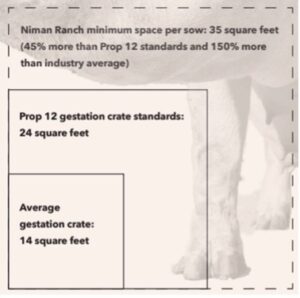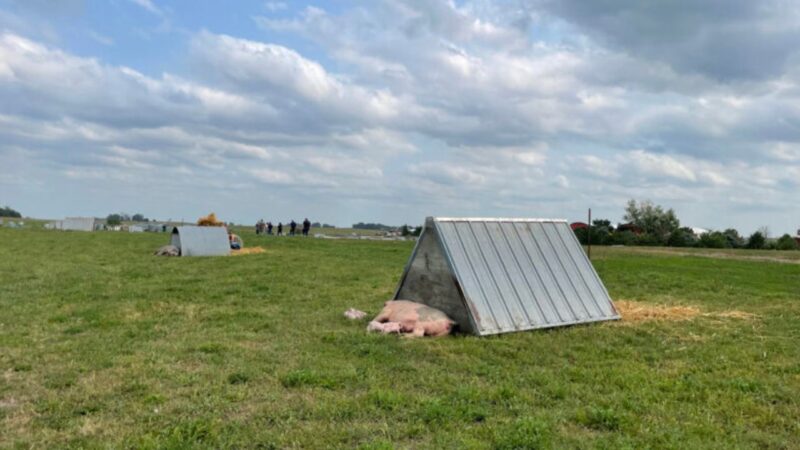Last Updated on December 7, 2022
In 2018, California voters approved Proposition 12, the Farm Animal Confinement Initiative (also known as Prop 12), which establishes minimum space requirements for housing animals, including calves raised for veal, breeding pigs (or sows), and egg laying hens. The law also bans the sale of protein from animals raised below the confinement minimum both in California and out-of-state.
As depicted in the image below, the average gestation crate for hogs is 14 square feet; under the Prop 12 proposal, the standards would increase to a minimum of 24 square feet.

The law was supported by nearly two-thirds (64 percent) of California voters.
So why are California voters still waiting to see the law they voted for go into action?
Given the space variances, large meat industry groups have strongly opposed Prop 12. After the law passed in 2018, pork producers across the country had nearly four years to comply with the new standard; however opponents have gotten involved by filing lawsuits in local and state California courts. So far, legal challenges have not been successful. In March 2022, the Supreme Court agreed to hear a constitutional challenge to Prop 12, which will be begin next week, on October 11, 2022.
Why ButcherBox Cares
At ButcherBox, humane animal treatment has been a core element of our sourcing standards since the company’s inception in 2015. It remains a key piece of the transformation we are pushing for within the meat industry today.
We work with farmers, fishermen, and third-party certifiers to ensure that animals throughout our supply chain are raised in environments that minimize stress and allow them room to move and exhibit natural behaviors. Our sourcing principles are one of the primary reasons Niman Ranch is our primary pork supplier. Niman Ranch hogs are raised on pasture or in deeply bedded pens and are never given antibiotics, ever.
In their impact report, Niman Ranch depicted the minimum amount of space required for each pig in their network of 650 family farmers compared to Prop 12 and the status quo in conventional pork systems. The dotted line shows that pigs in the Niman Ranch network have a minimum of 35 square feet per sow, a 150% increase over conventional systems.
At ButcherBox, we stand up for what we believe in. Our supply chain reflects standards that go beyond Prop 12 and humane animal welfare is something our members rely on us to simplify for them.
In a recent internal survey, our members were given a variety of topics related to improving the meat ecosystem to rate in order of importance. Our members indicated that “building a food system that is better for the animal” was the most important topic they considered when purchasing animal proteins. That’s why we took the time to file an Amicus Curie with the Supreme Court. This legal memo explains that this topic (Prop 12) and the Court’s decision to uphold the ruling will impact people other than the parties involved in the case: values driven companies like ours and our members.
Therefore, we felt compelled to share our perspective through our Amicus Curie, supported by our members’ interests, on the positive impacts Prop 12 would bring to animal welfare in the industry overall, if upheld.
One of the largest challenges with Prop 12 is that those who are not in compliance will need to invest significantly in more space or housing for their hogs. That’s why we’ve supported non-profits such as the Food Animal Concerns Trust (FACT) that provide grants to livestock farmers, including hog farmers, so they can improve or purchase new infrastructure to advance animal welfare on their farm.
While no piece of legislation is perfect, we believe that Prop 12 is a major step forward for animal welfare. Just like we stand up for what we believe in, we hope the Court will continue to uphold the values that Californians voted for.
Kelly Hilovsky is the Senior Manager of Social and Environmental Responsibility at ButcherBox. She has an MPH from Johns Hopkins and is committed to addressing complex social problems through the lenses of public health and food justice.



